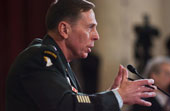
The bright lights of Hart 216 gleamed on the bright white foreheads of the Senate Foreign Relations committee (Barack Obama, the Senate’s only black member, showed up late) as General David Petraeus and Ambassador Ryan Crocker prepared for a second full day of hearings on the progress of the Bush administration’s troop “surge.” The Capitol Hill press corps filled most of the rest of the small hearing room, leaving only a bit of space at the back for audience members, Code Pink protesters, and assorted hangers-on.
After the House’s stultifying and seemingly unending session yesterday, hearing from someone with something new to say was a relief, even if that someone was Joe Biden (D-Stupid Comments/DE). Biden, who is leading the race for the Democratic presidential nomination in some alternate universe, used his opening statement to ask whether the warring factions in Iraq are any closer to a political settlement than they were last year and whether the political situation was likely to improve if the American presence continued. That theme would dominate the questioning from the Democrats for the remainder of the hearing.
It’s not particularly productive to go into detail about the prepared testimony of Petraeus and Crocker, which was exactly the same as what they submitted at the House hearing Monday. The content of it was widely reported in advance, and I already dissected it fairly thoroughly in a live blog yesterday. Readers who want more can turn to McClatchy’s Nancy Youssef and Leila Fadel, who wrote a great article outlining what Petraeus and Crocker didn’t say: that a lot of the progress in Baghdad has come because the Iraqis are ethnically cleansing mixed neighborhoods. Also, the Washington Monthly has a story this month explaining that Al Qaeda in Iraq (AQI), the force often described in media reports as the main enemy in the country, represents probably only five percent of the insurgency. Also worth noting was Petraeus’ claim that simply announcing the surge reduced violence, Crocker’s repeated assertions that political progress “must ultimately be made by Iraqis,” and Petraeus’ charts, which have been roundly criticized by bloggers, including the Monthly‘s Kevin Drum.
After Crocker and Petraeus did their duty by delivering rehearsed testimony, the pelting began. Biden began by asking Petraeus whether a Sunni could travel in a Shiite neighborhood without fear of being killed. Petraeus didn’t say “no,” but nor did he really answer the question. He said only that there were mixed neighborhoods where Sunnis could travel safely. Most of the time, Petraeus was careful to avoid direct answers, sometimes claiming that they were beyond his area of expertise. Part of the problem, as the Atlantic‘s James Fallows writes, is that “[Petraeus’] answers are being taken as proxies for a question no serving military officer should be asked in public: whether the effort for which he is asking his troops to fight and die is worth it.” Fallows argues that if Petraeus is the honorable man everyone believes him to be, he should be incapable of giving a negative answer to that question. And that makes his testimony inherently less useful to a country facing some tough decisions.
In the end, Petraeus did have a few interesting things to say. And it became obvious that the man loves his charts. The same can’t be said of Ambassador Crocker, who has a love for management-speak, meaningless platitudes, and mind-numbing repetition. Even Joe Biden called him out, at one point asking, “In non-diplomatic speak, what does that mean?” Crocker actually said things like, “Change is a daily occurrence” in Iraq. He spoke again and again of the “difficult” and “complicated” nature of the problems in Iraq without once explaining why they are difficult or how he plans to address them (it’s only his job, after all). There’s a chance that Crocker relies on rambling, clichéd, content-free answers because, as Eve Fairbanks and Matt Yglesias suggest, he may not believe a single word that he’s saying.
Most of the questions from Republicans were softballs, of course. Richard Lugar (R-IN) asked Crocker about David Brooks’ September 4 column in the New York Times praising the efforts of “organic local actors” in bringing stability to Iraq. Crocker said sure, local actors can help bring stability, which was an easy answer to an easy question. Later in the hearing, Norm Coleman (R-MN) discussed the time he had spent with Petraeus in Iraq (a favorite topic of senators from both sides of the aisle) and asked whether there was an “objective measure” of the progress of reconciliation, something to take comfort in “when we have the next downturn” in Iraq. Crocker gave Coleman the answer he was looking for, saying that “Benchmarks are misleading indicators.”
Chuck Hagel (R-NE), a Republican war critic who recently announced his retirement, was especially harsh toward the witnesses, and prominently referenced an August 19 New York Times op-ed by seven non-commissioned officers in Iraq that criticized the “pursuit of incompatible policies to absurd ends.” The only important concession he received was an acknowledgment from Crocker that “What happened in Anbar is politics.” [The administration has repeatedly cited Anbar as an example of the surge’s success, but Sunni Arabs in that area who have decided to fight with Americans and turn against Al Qaeda started to do so before the surge began.] Barack Obama (D-IL) used Crocker’s own words against him later, saying “Anbar doesn’t have anything to do with the surge.”
Barbara Boxer (D-CA), Russ Feingold (D-WI), and Obama all spoke against the war at length and with a passion that was largely absent from yesterday’s House hearings (New York’s Rep. Ackerman being the notable exception). John Kerry (D-MA) and Claire McCaskill (D-MO) rehashed classic arguments against the war, but didn’t exhibit the anger evident in the questions/speeches put forth by Boxer, Feingold, and Obama.
Despite all that’s been made of the past two day’s events in the media (and Mother Jones is far from innocent in this matter), the Petraeus/Crocker report is very unlikely to have a significant long-term impact on the war in Iraq. Those who are realistic about American domestic politics already know what Paul Richter wrote in the Los Angeles Times Tuesday: Bush wants to and probably will pass the war on to his successor. Senate Democrats don’t have the votes to end the war and House Democrats are unwilling to cut funding.
It’s not all bad for the Dems. If it’s done anything, the Petraeus/Crocker report has hardened Republican support for the war. That’s a problem for the GOP. Whatever the prospects are for long-term success in Iraq, the American people have run out of patience. Petraeus and Crocker repeatedly refused to predict more than six months ahead, but most of the war’s remaining supporters have said they expect “success” in Iraq will require many more years of American involvement. Barring some kind of paradigm-shifting event, that’s just not likely to happen. This kind of Republican stubbornness is going to hurt come election time.















